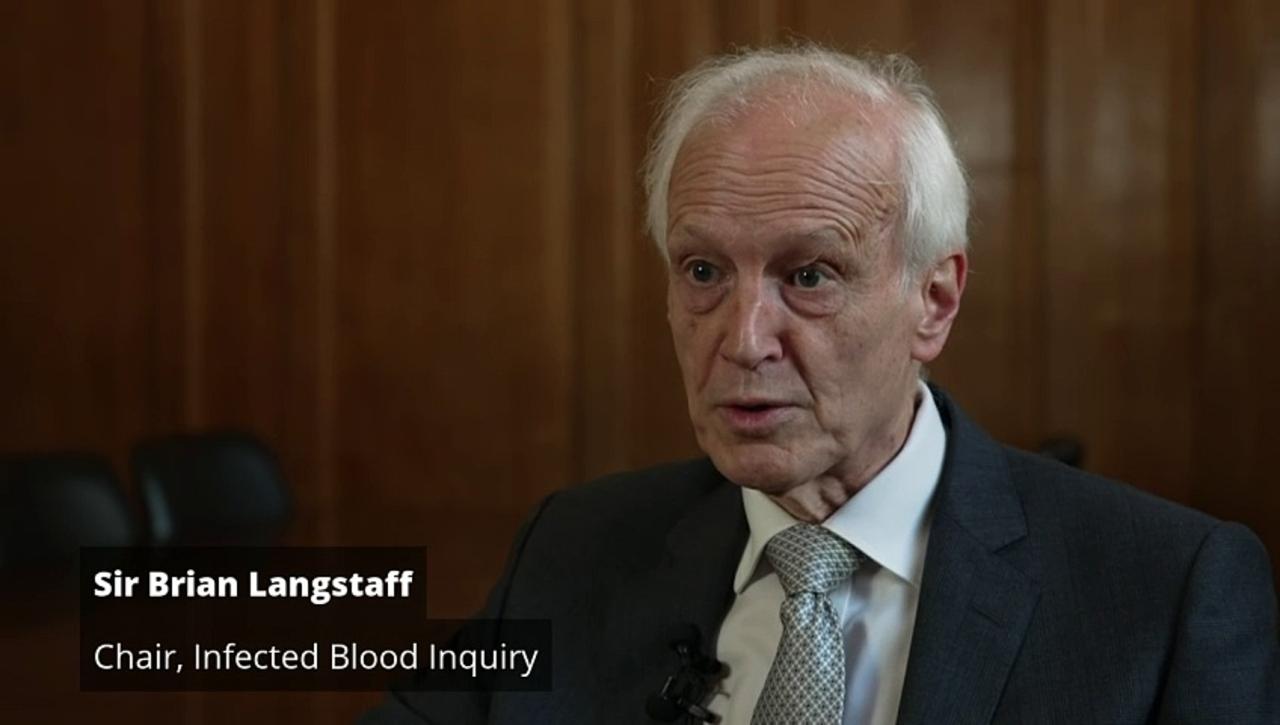Historical Context

The Infected Blood Inquiry delves into a dark chapter in UK healthcare history, marked by a series of tragic events that unfolded over several decades.
The infected blood inquiry has been a long and difficult process, but it is finally coming to an end. The inquiry has heard from hundreds of witnesses and has examined thousands of documents. It has concluded that the government was negligent in its handling of the infected blood scandal.
As a result of the inquiry, the government has agreed to pay compensation to the victims of the scandal. The inquiry has also made a number of recommendations to prevent a similar scandal from happening again. Meanwhile, a tornado warning has been issued for Iowa.
The National Weather Service is urging residents to take shelter immediately. The infected blood inquiry is a reminder of the importance of government accountability. It is also a reminder of the devastating consequences that can result from negligence.
The scandal revolves around the use of contaminated blood products, primarily sourced from the United States, which led to the transmission of HIV and hepatitis C to thousands of patients in the UK. The inquiry aims to uncover the root causes of this tragedy and identify the failures that allowed it to happen.
The Infected Blood Inquiry has revealed a litany of horrors, leaving a trail of shattered lives in its wake. Yet, amidst this somber landscape, there are glimmers of resilience. Just as the community of Greenfield, Iowa, has come together to rebuild after a devastating tornado tornado in greenfield iowa , so too must we find strength in the face of adversity.
The Infected Blood Inquiry may have exposed the darkness, but it has also ignited a flame of determination that will not be extinguished.
Timeline of Key Events
- 1970s-1980s: Importation of blood products from the US, some of which were contaminated with HIV and hepatitis C.
- 1983: First cases of HIV identified in the UK, primarily among hemophiliacs who had received contaminated blood products.
- 1986: Screening of blood products for HIV begins, but hepatitis C remains undetected.
- 1991: Screening for hepatitis C introduced.
- 1998: Public Inquiry into Contaminated Blood announced.
- 2009: Infected Blood Inquiry established.
Inquiry Process
The Infected Blood Inquiry was a public inquiry established in 1998 to investigate the contamination of blood products with HIV and hepatitis C in the United Kingdom. The inquiry was led by Lord Penrose, a retired judge, and its terms of reference were to:
- Inquire into the circumstances surrounding the infection of NHS patients with HIV and hepatitis C through the administration of blood products.
- Consider the role of government departments, the NHS, and other relevant bodies in the events leading to the infections.
- Make recommendations for preventing similar events from occurring in the future.
Key Individuals
The key individuals involved in the Infected Blood Inquiry included:
- Lord Penrose, Chairman of the Inquiry
- Robert Francis QC, Counsel to the Inquiry
- Janet Smith, Solicitor to the Inquiry
- Representatives from the Department of Health, the NHS, and other relevant bodies
- Victims and their families
Methods
The Infected Blood Inquiry used a variety of methods to gather evidence and conduct hearings, including:
- Public hearings
- Private hearings
- Document review
- Expert testimony
- Witness testimony
The Inquiry also commissioned a number of independent reports, including a report on the scientific evidence and a report on the legal framework.
The Infected Blood Inquiry is a public inquiry into the contamination of blood products with HIV and hepatitis C in the United Kingdom. The inquiry has been ongoing since 2018 and is expected to conclude in 2023. While the inquiry has been taking place, other events have occurred, such as the recent iowa tornadoes . These tornadoes caused widespread damage and loss of life, and they serve as a reminder of the importance of being prepared for natural disasters.
The Infected Blood Inquiry is continuing its work to ensure that the victims of the contaminated blood scandal receive justice.
Findings and Recommendations: Infected Blood Inquiry

The Infected Blood Inquiry was a public inquiry that investigated the contamination of blood products with HIV and hepatitis C in the United Kingdom. The inquiry found that the government and the National Health Service (NHS) had failed to take adequate steps to prevent the contamination of blood products and that this had led to the deaths of thousands of people.
The infected blood inquiry has brought to light the devastating consequences of contaminated blood transfusions. While the inquiry continues to uncover the extent of the tragedy, the news of the greenfield tornado today serves as a reminder of the fragility of life and the importance of supporting victims of both natural and man-made disasters.
The infected blood inquiry remains a crucial step towards ensuring justice for those affected and preventing similar tragedies in the future.
The inquiry made a number of recommendations to prevent similar tragedies from happening in the future. These recommendations included:
Increased regulation of the blood industry
- The inquiry recommended that the government introduce stricter regulations for the blood industry, including requirements for blood products to be tested for HIV and hepatitis C and for donors to be screened for these viruses.
- The inquiry also recommended that the government establish a new independent body to oversee the blood industry.
Improved communication between the government, the NHS, and the public
- The inquiry recommended that the government and the NHS improve their communication with the public about the risks of blood transfusions.
- The inquiry also recommended that the government establish a new system for compensating people who have been infected with HIV or hepatitis C through blood transfusions.
The impact of the inquiry’s findings on public policy
The Infected Blood Inquiry’s findings have had a significant impact on public policy. The government has introduced new regulations for the blood industry, and the NHS has improved its communication with the public about the risks of blood transfusions. The government has also established a new system for compensating people who have been infected with HIV or hepatitis C through blood transfusions.
Ethical and Legal Implications
The Infected Blood Inquiry uncovered several ethical and legal issues that had a profound impact on the healthcare system and the relationship between patients and healthcare providers.
One of the most significant ethical issues was the failure of healthcare professionals to adequately inform patients about the risks of receiving blood transfusions. Many patients were not aware that they could contract HIV or hepatitis from contaminated blood, and as a result, they were unable to make informed decisions about their treatment.
Legal Implications
The inquiry also had several legal implications. The government was found to be negligent in its handling of the blood transfusion scandal, and as a result, it was ordered to pay compensation to the victims. The inquiry also led to changes in the law, including the introduction of new regulations on the safety of blood transfusions.
Impact on Patient-Provider Relationship
The Infected Blood Inquiry had a profound impact on the relationship between patients and healthcare providers. The inquiry revealed that healthcare professionals had failed to meet their ethical and legal obligations to patients, and as a result, trust between patients and providers was eroded.
Lessons Learned
The Infected Blood Inquiry has highlighted several crucial lessons that can help improve healthcare systems and patient safety. These include the importance of transparency, accountability, and patient-centered care.
Transparency and Accountability
The inquiry emphasized the need for transparency and accountability in healthcare systems. This means that healthcare professionals and institutions should be open and honest about their actions and decisions. They should also be held accountable for any errors or mistakes they make.
- Transparency and accountability help to build trust between patients and healthcare providers.
- They also help to prevent errors and mistakes from happening in the first place.
Patient-Centered Care, Infected blood inquiry
The inquiry also highlighted the importance of patient-centered care. This means that healthcare professionals should always put the needs of their patients first. They should listen to their patients’ concerns and preferences, and they should involve them in making decisions about their care.
- Patient-centered care helps to improve patient satisfaction.
- It also helps to improve patient outcomes.
As the infected blood inquiry continues to unfold, it’s worth noting that in the midst of the tragedy, there have been moments of resilience and hope. Like the aftermath of the greenfield tornado , where communities came together to rebuild and support one another.
The infected blood inquiry serves as a reminder of the importance of accountability and justice, even in the face of adversity, just as the greenfield tornado showed us the strength and compassion of the human spirit in the wake of devastation.